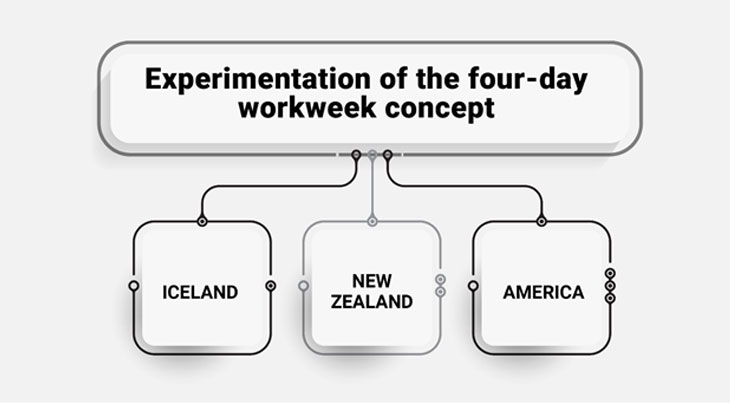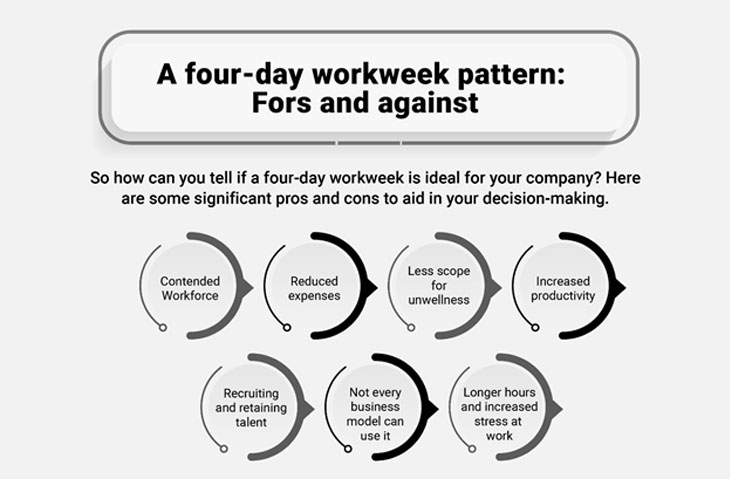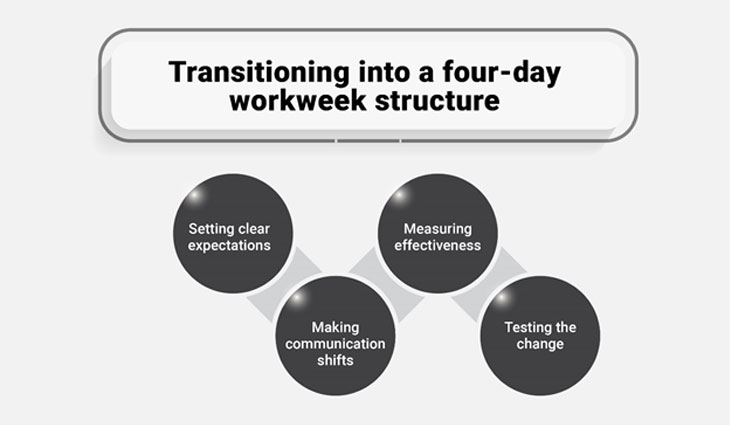
The definition of a four-day workweek is compact; the operations that take place from Monday to Friday should be diluted to four days, Monday to Thursday. The four-day week of work is often handled by businesses in one of two ways:
In 1956, Vice President Richard Nixon predicted a four-day work schedule in the near future. The idea of implementing a four-day workweek is probably dismissed by the majority of employers today. Everyone is accustomed to a five-day workweek, so reducing the number of days people spend working — and, as a result, reducing the amount of time they invest in the office — would seem to result in a decrease in the volume of goods or services produced, cutting a company's revenues.
The five-day workweek was once a striking model that made the most of its employees, but it was developed in the 19th century when factory work was the standard. Then, after finishing their duties, they would go home. All there was to it was that.
However, given the advancement of technology and the rise in office jobs, the adage that working more hours means being more productive is no longer universally applicable. The ability to balance work and life has suffered. When examining generational disparities, Gen-X respondents preferred a 4-day workweek to an unlimited amount of vacation time, whilst millennials preferred the freedom to take a much-needed vacation whenever they wanted.

The pandemic situation sent stress levels soaring. Since then, several parts of the world have been actively conducting surveys to see if this is the future of businesses and organizations.
Unexpectedly, Japan, a country known for its overworked workforce, is also debating switching to a four-day workweek.

So how can you tell if a four-day workweek is ideal for your company? Here are some significant pros and cons to aid in your decision-making.
Employees have more free time and the opportunity to enhance their work-life balance when the weekend is three days long. There won't be many complaints about that.
It's a give-and-take situation when you have more time to accomplish the things you enjoy because it makes you happier all around and may even improve your loyalty to a business.
Everyone may save money by working four days a week. The apparent one is that operating costs would reduce significantly as a result of the workplace being closed for one extra day each week.
Additionally, employees would pay less for their daily commutes and would spend less on things like lunch and coffee breaks.
According to the World Health Organization (WHO), global mental health issues have witnessed a steady rise over the years and has accentuated further by the outbreak of COVID-19
A longer weekend will enable employees to spend a longer period with their loved ones and do the activities they enjoy, which will inevitably boost their well-being.
Additionally, it will provide them a second opportunity to sleep in each week, which will allow them to recharge a bit more after a demanding week.
Members of staff are often distracted by unhappy employees. A shortened workweek is generally justified because contented employees are more attentive to their tasks when they are on the job.
New Zealand company Perpetual Guardian experimented with a four-day workweek. According to the findings, 78 percent of employees might better juggle their professional and personal lives. This contrasted with 54 percent before the experiment.
Being able to offer a flexible work schedule is undoubtedly a benefit that keeps employees in a company in the millennial age. According to research, 63 percent of employers found it simpler to find and keep qualified employees when they worked a four-day week. This work-life bonus, which is currently a relatively uncommon provision, can be a terrific way to attract the best talent and retain them as well.
Unfortunately, not every business can benefit from the preposition of a four-day workweek. Only businesses that can completely re-adapt their operations to a new style of functioning should choose this alternative.
You must decide whether or not the four-day work concept is appropriate for your firm before taking the significant step of adopting a new style of working.
Most employees working a four-day week will probably be required to put in the same 40-hour workweeks, but on four rather than five days. Shifts might be increased to 10 hours in this situation.
The amount of stress your employees' experience and, consequently, their general well-being and productivity could be greatly impacted by longer workdays. Although it is believed that taking more time off from work improves an employee's work-life balance, if they put in the greater effort during their new "working week," they may discover that their balance is genuinely harmed.

Companies must change the way they operate if they are to successfully make the switch to a four-day workweek. Four things hold the key to a shortened workweek without sacrificing productivity.
A successful shift will be largely dependent on expectation management from the beginning.
The four-day workweek is reciprocal. The company should clearly define boundaries for its employees (such as no emailing or slacking from Friday through Sunday), but they also need to be required to maintain their commitment.
Employers shouldn't anticipate a decline in productivity, as evidenced by the facts. In actuality, the majority of findings from studies on a four-day workweek shift pattern indicate the contrary.
Importantly, it is the responsibility of team leaders to set up activities in a way that allows employees the flexibility they require to do their work in a constrained amount of time. Cleaning up their calendars is the first step toward removing interminable meetings from their schedules and switching to asynchronous communication. This will increase productivity, prevent misunderstandings, and save crucial time.
A top-down strategy is the most effective way to constructively set expectations. Expecting your staff to embrace async communication without setting an example and be excited about a four-day workweek schedule will not be well received.
Make sure to specify the measures being used to analyze effectiveness in order to see if the new working style appears to be as beneficial on paper as it does in culture. These should have both quantitative and qualitative components, as a combination of the two typically yields the most complete picture. You can also mention stress levels, work quality, talent quality, and mental well-being.
For instance, if your goal is to gauge productivity, you might want to consider:
Examine your company's internal communication channels and meeting landscape before switching to the new pattern of working.
Your staff has likely made significant advancements in their ability to operate remotely given that nearly half of businesses were remote in 2020. In the four-day workweek, several techniques you employed to optimize remote operations will be quite helpful.
For instance, it will be crucial to be able to communicate asynchronously or to respond to the same project, idea, or conversation several times. This is particularly true if you assume that some employees are working Monday through Thursday, some Tuesday through Friday, etc.
Before you can shorten your workweek to boost productivity on weekdays, you first need to address the problem of too many meetings that plagues most businesses. In most office environments, tools such as phone messaging are just as productive as meetings.
Without conducting a test first, you wouldn't change your website copy or product budget. Consider testing the four-day workweek at your company for a shorter amount of time—say, a few months—but long enough to see how employees calibrate.
Establish benchmarks and don't promise to continue until everyone is at ease with the test. As with everything in business, experiment and react to the facts to eliminate friction.
Some industries and organizations practice their own schedules. Some businesses cannot afford to have all employees absent for a whole day or three consecutive days. It is the flexibility that works best when firms try to introduce new things to solve organizational stress and burnout. Most companies already have a four-day week, but it's buried under a whole bunch of outdated practices and bad meetings. Once that's cleared away, they have a good chance of achieving desired results from the four-day workweek.

CredBadge™ is a proprietary, secure, digital badging platform that provides for seamless authentication and verification of credentials across digital media worldwide.
CredBadge™ powered credentials ensure that professionals can showcase and verify their qualifications and credentials across all digital platforms, and at any time, across the planet.

Please enter the License Number/Unique Credential Code of the certificant. Results will be displayed if the person holds an active credential from TMI.